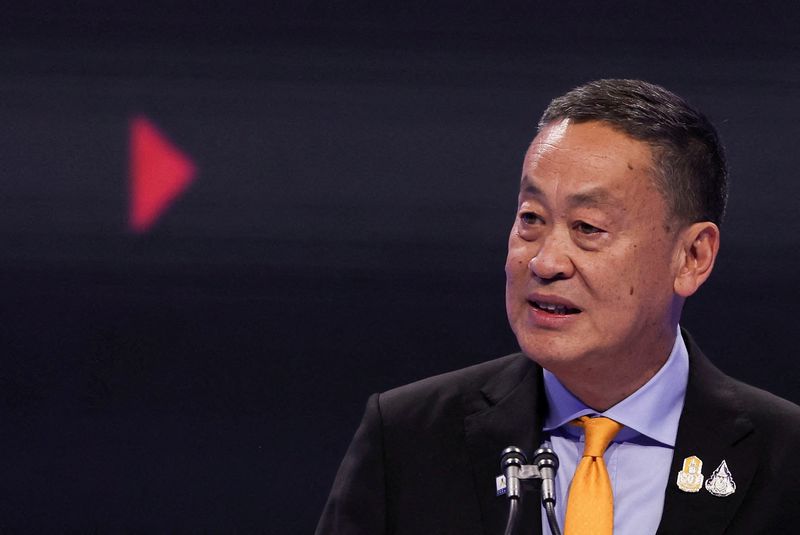
© Reuters. FILE PHOTO: Srettha Thavisin, Prime Minister of Thailand, speaks at the Asia-Pacific Economic Cooperation (APEC) CEO Summit in San Francisco, California, U.S., November 15, 2023. REUTERS/Carlos Barria/File Photo
By Orathai Sriring and Chayut Setboonsarng
BANGKOK (Reuters) -Thai Prime Minister Srettha Thavisin on Wednesday stuck to his belief that the country’s economy was in crisis and said he would roll out stimulus measures on top of handouts, despite the central bank governor’s disagreement with his approach.
The comments come after Sethaput Suthiwartnarueput, the bank’s governor, told Reuters the previous day that the government’s quick stimulus measures would not fix structural issues plaguing Southeast Asia’s second-biggest economy.
“I confirm that the economy is not doing well and is in crisis,” Srettha told reporters, adding it was fine if the central bank chief disagreed with him.
This week the government slashed 2024 growth projections to 2.8% from an earlier forecast of 3.2% on weaker exports and lower foreign tourist numbers. It also lowered the 2023 growth estimate to 1.8% from 2.7%. Growth in 2022 was 2.6%.
In the interview, Sethaput, the Bank of Thailand (BOT) governor, said growth had been slower than expected but the economy was not in crisis, as the government portrayed.
The BOT chief has drawn fire from the premier for not cutting interest rates, despite low inflation.
A political newcomer who is also finance minister, Srettha has told the governor that high rates were hurting businesses and has urged the BOT to lower rates, which are at a decade-high of 2.5%.
His government has promised a slew of stimulus measures to revive the economy, including a $14 billion handout programme targeting 50 million Thais, to be spent within six months.
“Reducing interest rates is a central bank matter … but there will be more policies in addition to the digital wallet,” Srettha said.
Separately on Wednesday, a finance ministry official said Thailand’s baht currency was expected to average 34.4 a dollar this year, driven by dollar weakness. The baht was traded at about 35.8 a dollar on Wednesday.
The baht is expected to strengthen in line with currencies of other countries seeing economic recovery, while higher foreign tourist numbers are also supporting it, Warotai Kosolpisitkul, an adviser to the ministry’s Fiscal Policy Office, told a briefing.
Thailand’s economy is expected to continue growing while the country should record a bigger current account surplus, he said.
Source: Investing.com


























